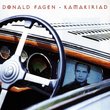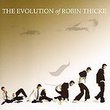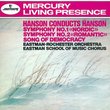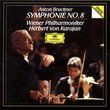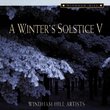| All Artists: Erik Satie, Reinbert de Leeuw Title: Satie: The Early Piano Works Members Wishing: 0 Total Copies: 0 Label: Philips Release Date: 3/17/1998 Genres: Dance & Electronic, Classical Styles: Ballets & Dances, Baroque Dance Suites, Instruments, Keyboard, Symphonies Number of Discs: 2 SwapaCD Credits: 2 UPC: 028946216125 |
Search - Erik Satie, Reinbert de Leeuw :: Satie: The Early Piano Works
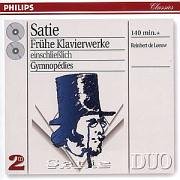 | Erik Satie, Reinbert de Leeuw Satie: The Early Piano Works Genres: Dance & Electronic, Classical
|
Larger Image |
CD DetailsSimilarly Requested CDs
|
CD ReviewsEric Satie with Alzheimer's Disease. rachel@ilhawaii.net | Hilo, Hawaii, USA | 04/25/2001 (4 out of 5 stars) "I'm sorry but my taste varies from the other reviews here. I actually like Satie's pieces as little classical miniatures. That is why they are so charming. I do not like waiting several seconds for the next note and not being able to recognize which piece I'm listening to because it is hanging in the air like a zen koan. While I agree that Leeuw's avant garde interpretation brings out mystical qualities, they are of the same sort as listening to water drops from a faucet. I can meditate on that but would I want to? I gave it 4 stars because what he does, he does very well in his own weird minimalist way. Would I buy the recording again if I had the choice? Not!" Satie as you have never heard him ! 01/23/1999 (5 out of 5 stars) "Reinbert de Leeuw is the most original piano interpret I have ever heard ! His versions of Eric Satie's famous Gymnopedies are unique, because his plays them so slowly that it is sometimes difficult to recognise them; you re-discover them as you hear him play. This is the perfect approach to play some famous pieces people have heard so many times in a refreshing way. Of course, this is different from the "classic" way to play Satie, as Philippe Entremont did in a definitive way. But Reinbert de Leeuw is really original : it is the slowest interpretation of Satie's pieces. There is a few seconds silence between each note. Reinbert de Leeuw has recorded Satie's pieces twice : his first attempts in the 70's (in ADD) were even slower than the recent (DDD), all made for Phillips. The 1998 Phillips 2 CDs package contains the slowest versions." Satie elevated to his true height Victor Eijkhout | Knoxville, TN USA | 12/22/1999 (5 out of 5 stars) "Most performers approach Satie's pieces as if they are merely charming miniatures. By taking extremely slow tempi - we are literally talking half speed of what others do - Reinbert de Leeuw brings out the mystic qualities of the piano pieces. These performances are unlike anything you'll hear."
|

 Track Listings (16) - Disc #1
Track Listings (16) - Disc #1
